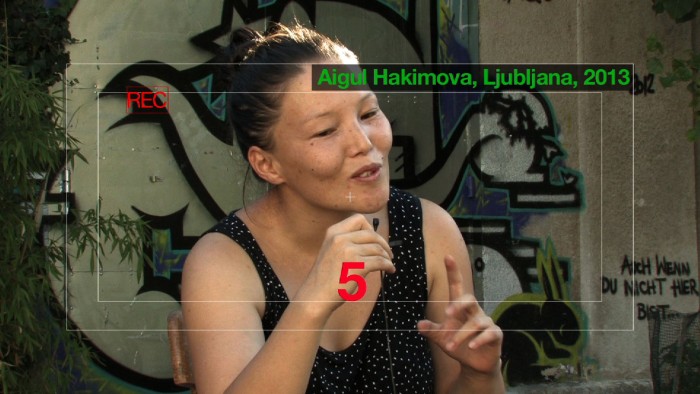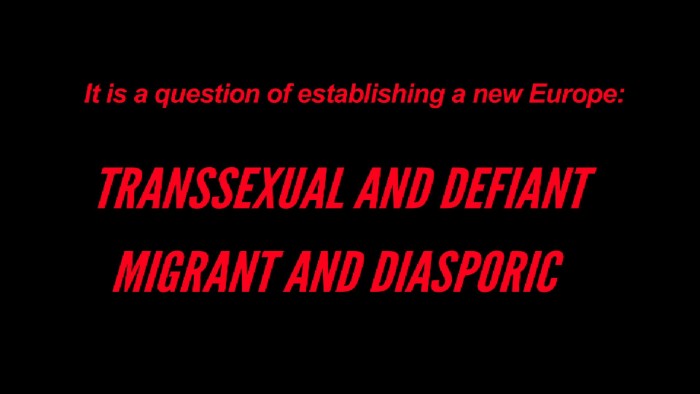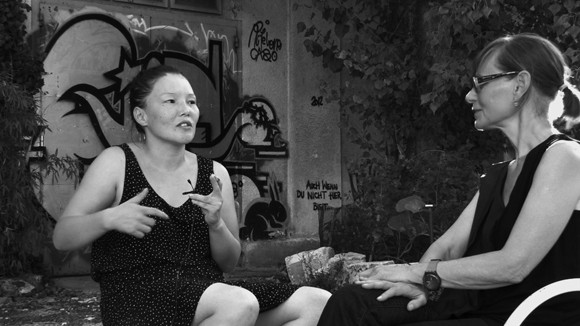Unterstützend € 10
Acknowledgment in film credits and our websites.
Every contribution is very important for us! As acknowledgment your name will be written in film credits and our websites.
> 01 Kofinanzierer
Damit wir unsere Webseite für Sie optimal gestalten und fortlaufend verbessern können, verwenden wir Cookies. Durch die weitere Nutzung der Webseite stimmen Sie der Verwendung von Cookies zu. Weitere Informationen zu Cookies erhalten Sie in unserer Datenschutzerklärung für Cookies
Migration, Sex, History: Africa/Europe
 Min.
Min.
 Opt.
Opt.
 Austria, Hungary, Poland, Germany, Netherlands, France, Britain, Spain, Switzerland, Italy, Slovenia.
Austria, Hungary, Poland, Germany, Netherlands, France, Britain, Spain, Switzerland, Italy, Slovenia.
Every contribution is very important for us! As acknowledgment your name will be written in film credits and our websites.
If your contribution is 20€, as acknowledgment your name will be written in film credits and our websites. As well you will receive the link IN ADVANCE to download the film (SD)
If your contribution is 35€, as acknowledgment your name will be written in film credits and our websites. As well you will receive the link IN ADVANCE to download the film (SD) and the Journal Deartikulacija I and II in pdf.
If your contribution is 50€, as acknowledgment your name will be written in film credits and our websites. As well you will receive the link IN ADVANCE to download the film (SD), the Journal Deartikulacija I+II in pdf, and DVD with a selection of video-interviews.
If your contribution is 100€, as acknowledgment your name will be written in film credits and our websites. As well you will receive the link IN ADVANCE to download the film (HD), the Journal Deartikulacija I+II in pdf. and a copy of the film on DVD.
Solidary contribution. If your contribution is 300€, as acknowledgment your name will be written in film credits and our websites. As well you will receive the link IN ADVANCE to download the film (HD), the Journal Deartikulacija I+II in pdf. and a copy of the film on DVD with a selection of video-interviews
Solidary contribution. If your contribution is 500€, as acknowledgment your name will be written in film credits and our websites. As well you will receive the link IN ADVANCE to download the film (HD), the Journal Deartikulacija I+II in pdf., a copy of the film on DVD with a selection of video-interviews and the book Mind the Map!-History is not Given (http://grzinic-smid.si/?p=1156)
A Research into Labor, Theory, Activism and Migration from Africa into Europe in the 21st century. (Why is Africa cursed in Europe?)
 Aufgabe
Aufgabe
|
Minimum | Optimum |
|---|---|---|
|
TRAVEL EXPENSES 1
The film will be a documentary fictionalized road movie for the 21st century that will consists of several interviews, making a round trip from Hungary, Austria, Poland, Germany, Netherlands, France, Britain, Spain, Switzerland, Italy to Slovenia.
FIRST PART: DEPARTURE/DECEMBER 2013 (CAR)
4.12 Budapest: interviews
5.12 Vienna: interviews
6.12 Warsaw: interviews
7.12 Berlin:interviews
8.12 Munich: interviews
9.12 Linz: interviews
10.12 Milan: interviews
GASOLINE, TOLL
|
€ 800 | |
|
TRAVEL EXPENSES 2
SECOND PART: JANUARY/FEBRUARY/MARCH 2014 (AIRPLANE)
London, Paris, Amsterdam, FLIGHT TICKETS (low cost),
|
€ 900 | |
|
FILMING+EDITING
Filming and editing of the film from April to June (Barcelona, Ljubljana)
|
€ 500 | |
|
Travel expenses 1 (Accomodation)
FIRST PART: DEPARTURE/DECEMBER 2013 (CAR) 4.12 Budapest: interviews 5.12 Vienna: interviews 6.12 Warsaw: interviews 7.12 Berlin:interviews 8.12 Munich: interviews 9.12 Linz: interviews 10.12 Milan
ACCOMODATION
|
€ 400 | |
|
TRAVEL EXPENSES 2 (Accomodation)
SECOND PART: JANUARY/FEBRUARY/MARCH 2014 (AIRPLANE) London, Paris, Amsterdam
ACCOMODATION
|
€ 400 |
 Material
Material
|
Minimum | Optimum |
|---|---|---|
|
MATERIAL
2 hard discs for archiving the material and copies (1TB)
|
€ 300 | |
| Gesamt | € 2.500 | € 3.300 |
Departing from a tradition in politically engaged art experimental projects, we want to make a film to reflect on Europe and its borders, elaborating different conditions for living and acting. This is coming as an imperative. It is a question of establishing new possibilities for forming a different, but counter, almost bastard, dissident history of Europe, better to say of EU, that is, of migration, empowerment and reflection. Transsexual and defiant. The film strives to produce another history and to delink itself from conventionality of the melodramatic language and narratives presented by official film productions.
The idea is to travel in Europe and instead of easy TV objective didacticism to recollect statements by those, that we as authors of the film, found important in their writings, analyzing, performing. From serious academic positions, but still not part of the mainstream, to revolutionary usage of poetry, to analysis of concrete migration, deportation and discrimination processes. Those that we selected are not just speaking heads, they are already forming the political agenda of the film.
The film as well departs from an idea of the financialization of economy as finanancialization of images. Spectral, murky, not identifiable centers of power, while the people in the protests can be looked online, and are so clearly depicted. What can be done with images and text with and by those new and old migrants positions, especially the one coming from Africa?
The film will depict this overflow of images and the European Union urban life with all the restrictions that are imposed on judicial, economical and civil rights and the possibilities.
The film will be a documentary fictionalized road movie for the 21st century that will consists of several interviews, making a round trip from Hungary, Austria, Poland, Germany, Netherlands, Britain, France, Spain, Switzerland, Italy to Slovenia.
It is necessary to radicalize the language of film, to collect, elaborate and stage, if necessary, the discussions on the present situation of dispossessions, discrimination and exploitation in order to make the images of violence (against refugees, asylum seekers and those seen as different, as others, the rest) clearly present here and now. The idea is to situate a film in between not quite a documentary, not a narrative, fiction either, but to incorporate the elements of both; particularly the insertion of documentary to disrupt the narrative flow; the fragmentation and re-arrangement of the plot.
The lines are the Third cinema conceived by Fernando Solanas and Octavio Getino, the L.A. Rebellion film movement (Charles Burnett, Haile Gerima and Julie Dash), The Black Audio Film Collective (BAFC) with John Akomfrah, the Sankofa collective of black British filmmakers with Isaac Julien, Martina Attille, Maureen Blackwood, Nadine Marsh-Edwards, etc. and the golden age of Yugoslav Black cinema with Dušan Makavejev, Živojin Pavlović, Aleksandar Petrović, Želimir Žilnik.

Let’s say “Each generation necessarily engages in a process of rewriting/reconstituting the past. Film makers have to paint their own landscapes; they must breathe new life into each moment in cinema. That can only be achieved when practitioners have mapped out the field of visual representations and the film techniques they wish to deploy.” - Reece Auguiste, Member Black Audio Film Collective (BAFC)
The social, political space is disintegrating under economic pressures, neoliberalizations and bigger and bigger precarity. This results in a situation of deterioration of rights by those who were seen as not being part of nation body. Uprisings and self-organization of workers and refugees open the questions of discontinuities in the history of Europe after WWII. Practically we see the passage from migrants to criminals, the reactionary narrativisation of past colonialism, present refugees and new forms of racisms.
Depoliticization of the space of Europe is going on with strong criminalization that leads to violent decomposition of political demands.
The EU politics is the one of brutality, racial undercurrents, economic inequalities and silenced history of migration and immigration. The EU is a place of a constantly hiding its proper policy of colonialism, anti-Semitism and racism, and therefore it is the intention to construct a different logic to dominant thinking on migration, sexuality and history. The refugees, the migrants are presented as uneducated and passive while the idea is to see them speaking, contextualizing their positions, reflecting. Also regarding aesthetics, it is here the point of the rest, the others, of the bastards.
Nation-state always functions through a production of a space of unity based on the blood and soil. A construction of a nation-state new archive is an archive without migrants. By “‘ideology’ we are not referring to the sitting ducks of cultural criticism: race, class, and gender. Instead [. . .] ideology in the most basic sense of the word: as a rational legitimization of the existing order and a tacit agreement in which everyone is involved: politicians and venture capitalists, administrators and….” (Lara Nielsen).
Parallels can be drawn and used in terms of analyzing migration with judicial demands in terms of rights and papers and even more the idea of labor, division of labor while developing a political position with and through the film. In Sensible Politics. The Visual Culture of Nongovernmental Activism McLagan and Mc Kee say: “Attending to political aesthetics means focusing not on a disembodied image that travels under the concept of art or visual culture, nor on a preformed domain of the political that seeks subsequent expression in media form. Instead, it requires bringing the two realms together into the same analytic frame.”
The idea is to provide alternatives to classical and official mainstream cinema. To eschew the conventions and rework them being influenced by films from Latin America, the Black film movements, and the emerging cinema of Africa. The point of departure that is in the back of the film is several conditions, deliberations formed by several groups of conceptual revaluation of the film aesthetics in connection with social and political topics that has to be brought and elaborated in the film production.
Those who will participate in the project after we made the research are several; Araba Evelyn Johnston-Arthur, Belinda Kazeem, Njideka Stephanie Iroh, Marissa Lôbo, Rubia Salgado, Alessandra dos Santos Silva (Austria), Timea Junghaus (Hungary), Monika Bobako, Marcin Starnawski (Poland), Grada Kilomba, Sabine Schiffer, Constantin Wagner (Gemany), Kwame Nimako, Gloria Wekker, Philomena Essad (Netherlands), Ibrahim Saydi, Kheraba Drame, Yast Solo, Andrés García, Beatriz Preciado, Toni Serra (Spain), Marie Hélène Bourcier (France), Paul Gilroy, Sara Ahmed (Great Britain), Simon Njami (Switzerland), Domenico Losurdo, Silvia Federici, Antonella Corsani, Sandro Mezzadra (Italy), Šefik Tatlić(Croatia), Aigul Hakimova (Slovenia)

Expanding connections, networking, distributing and elaborating alternative knowledge systems that attack the imperial occidental matrix of power that hides processes of enslavement, pauperization, poverty.
With this crowdfunding campaign we want to cover the costs of filming and editing of our documentary, while traveling around Europe, from Hungary, Austria, Poland, Germany, Netherlands, Britain, France, Spain, Switzerland, Italy to Slovenia.

Marina Gržinić, artist, theoretician, professor at the Institute of Philosophy SASA (Ljubljana) and Academy of Fine Arts Vienna. Her academic and artistic work is in the field of contemporary philosophy and aesthetics after modernism, with a particular emphasis on the theory of ideology, the theory of technology, biopolitics, video technology and art (theories of media and virtual worlds), and feminism and contemporary art.
She works in collaboration in the field of video and media art with Aina Šmid (born in Ljubljana, 1957); Aina Šmid as well work in projects of journalism, she is presently a free-lance writer. Marina Gržinić and Aina Šmid work together from 1982, they produced 40 videofilms and installations.
From 2010 they entered many other collaborative networks and collaboration.
From 2010 they collaborate with Tjaša Kancler in numerous projects of theoretical, political and media work.
Tjaša Kancler, artist, activist and associated professor at the Department of Design and Image, Faculty of Fine Arts, University of Barcelona. S/he works in collaboration with Anja Steidinger on kronotop.org (www.kronotop.org), a research project and an online archive of video-interviews with artists, filmmakers, theorists and activists, conceptualized as a collective space for enunciation with the intention to relate art, activism, politics and critical theory.
The team is small: three people that work together and do everything from shooting, developing the screenplay, editing and website, and elaborating theoretically the whole project.


Acknowledgment in film credits and our websites.
Every contribution is very important for us! As acknowledgment your name will be written in film credits and our websites.
> 01 Kofinanzierer
Acknowledgment in film credits and our websites + link in advance to download the film (SD)
If your contribution is 20€, as acknowledgment your name will be written in film credits and our websites. As well you will receive the link IN ADVANCE to download the film (SD)
> 01 Kofinanzierer
Acknowledgment + link in advance to download the film (SD) + Journal Deartikulacija
If your contribution is 35€, as acknowledgment your name will be written in film credits and our websites. As well you will receive the link IN ADVANCE to download the film (SD) and the Journal Deartikulacija I and II in pdf.
> 00 Kofinanzierer
Acknowledgment + link in avdance to download the film (SD) + Journal Deartikulacija + DVD with video-intreviews
If your contribution is 50€, as acknowledgment your name will be written in film credits and our websites. As well you will receive the link IN ADVANCE to download the film (SD), the Journal Deartikulacija I+II in pdf, and DVD with a selection of video-interviews.
> 02 Kofinanzierer
Acknowledgment + link in advance to download the film (HD) + Journal Deartikulacija + copy of the film on DVD.
If your contribution is 100€, as acknowledgment your name will be written in film credits and our websites. As well you will receive the link IN ADVANCE to download the film (HD), the Journal Deartikulacija I+II in pdf. and a copy of the film on DVD.
> 02 Kofinanzierer
Acknowledgment + link to download in advance the film (HD) + Journal Deartikulacija + copy of the film on DVD with EXTRA
Solidary contribution. If your contribution is 300€, as acknowledgment your name will be written in film credits and our websites. As well you will receive the link IN ADVANCE to download the film (HD), the Journal Deartikulacija I+II in pdf. and a copy of the film on DVD with a selection of video-interviews
> 00 Kofinanzierer
Acknowledgment + link to download the film (HD) + Journal Deartikulacija + copy of the film on DVD with EXTRA + book Mind the Map!-History is not Given
Solidary contribution. If your contribution is 500€, as acknowledgment your name will be written in film credits and our websites. As well you will receive the link IN ADVANCE to download the film (HD), the Journal Deartikulacija I+II in pdf., a copy of the film on DVD with a selection of video-interviews and the book Mind the Map!-History is not Given (http://grzinic-smid.si/?p=1156)
> 00 Kofinanzierer
We are looking for people to help spread the word about our project through social networks, blogs, websites, publications
If you are an organizer of an alternative film festival or other activist initiatives and cultural events and you like our film, contact us!
We are looking for people to translate our film into Spanish and other languages for the international distribution.
We are looking for people to help us with a transcription of video-interviews which will be published on the website of the project, www.africa-europe